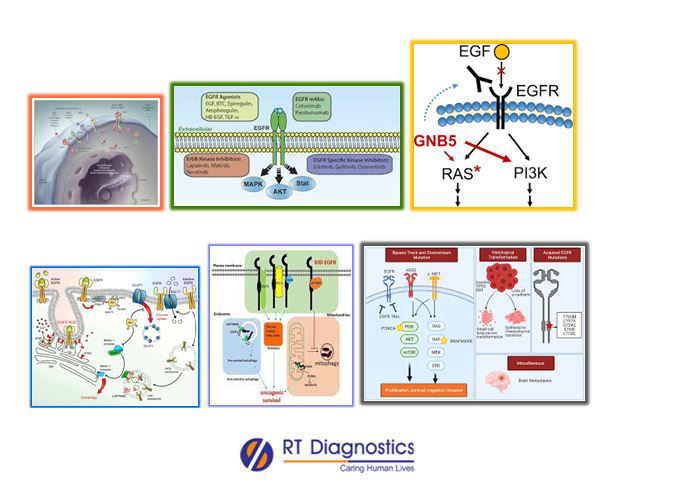EGFR – DNA – Mutation RT-PCR:
Why EGFR – (DNA Mutation) RT-PCR Test?
CLINICAL INFORMATION
EGF mean epidermal Growth Factor. EGFR gene sends a signal to synthesize a protein also called epidermal growth factor receptor protein (membrane receptor component is composed of protein). Thus EGF receptor is a protein present in the cell membranes that help cells grow and divide (while its down-regulation is counter balanced by Tyrosine kinase mediated activation of Ras-Raf-MAPK pathway, which helps to prevent and block EGF pathway when not required). EGFR - Epidermal Growth Factor Receptorbinds to at least 7 different ligands. The binding of these (any of these 7) ligands to the EGFR protein receptor brings about a conformational change that further allows that modified receptor to attach, to another nearby EGFR –receptor protein, thus forming a dimer receptor-activated complex. Therefore this receptor-activated complex transmits further stronger signals to promote cell growth and cell division. Any mutation (deletion or insertions eg. EGFR 19 deletion, EGFR exon 20 insertions, point mutation like EGFR L858R etc) in the gene makes those cells grow at a much faster rate, resulting in cancer. In certain pathologies EGFR gene gets mutated hence DNA fails to produce normal levels of EGFR (desired specific – EGFR Receptor Protein, since abnormal or defective EGFR receptors become insensitive to the specific ligands – due to their high specificity) membrane receptor proteins, consequently their (levels) desired action are also decreasedthan normal level(moreover by default it sends overexpression of unwanted, wrong and faulty signals to those mutated cells allowing the cancer cells to grow and spread faster) and hence tests positive for EGFR – Gene Mutation Test is performed by PCR. Thus this test is used as a bio-marker (tool) to screen for EGFR gene mutations, and also for prognosis – to detect EGFR mutations in the tumor that can predict potential responsiveness or resistance to targeted therapies like surgery, chemotherapy, radiation therapy, Immunotherapy like monoclonal antibodies etc. This test requires a conventional tissue biopsy like needle aspiration (FNAC), bronchoscopy etc (in addition, liquid biopsies i.e blood sample specimen may also be collected for circulating tumour DNA – ctDNA) for its diagnosis. PCR – Polymerase Chain Reaction (PCR) technology (involves 3 main stages, denaturation, annealing and elongation), is very sensitive used in medical as well as research for elucidating DNA sequencing. This test involves the extraction of genetic material by isolation and helps amplify the genetic material (DNA Cloning method by PCR) present in the sample specimen to many folds by replication. Thus the amplified sample specimen detects and reads the signal and test results are interpreted as positive or negative. Therefore PCR application in genetic testing is performed to detect pathogenic or altered or mutated DNA (i.e error in a specific part of DNA). RT-PCR: Reverse Transcriptase PCR or RT-PCR allows the use of RNA as a template (since some viruses contain only single-stranded RNA instead of DNA). An additional step allows the use of RNA as a template (RNA is transcribed using the enzyme RNA Polymerase into its complementary DNA – cDNA, which is RNA-DNA hybrid), which is then amplified, detected and quantified for test results. Most mutations in EGFR trigger a type of cancer called non-small cell lung cancer– NSCLC (not associated with smoking) are of 3 main types, namely Adenocarcinoma, Squamous cell carcinoma and Large cell carcinoma. Additional tests include X-Rays, CT scans, PET scans, bone scans etc.

General Instructions:
Sample Requirement: Specimen - Cancer cells from the Biopsy. Test Preparation: Suggestions from the doctor.
NOTE - Sample for specimen collections may vary based on the patient’s condition/cases according to the patient’s presenting complaints/signs or symptoms:
SPECIMEN REQUIREMENT (Special or Rare Cases) - As instructed and guided by Physician / Clinician / Pathologist / as per Laboratory’s requirements, according to procedures and protocols.
This Multi-Specialty Clinical Referral Laboratory RTDIAGNOSTICS provides precise and accurate tests with an extensive range of testing services to the medical centres to help in the diagnosis and identification of pathology in the test specimens for infectious diseases and also to evaluate the function of organ systems of the patient. It prevents further complications and helps to stabilize and restore health to near normalcy at the earliest without delay.



